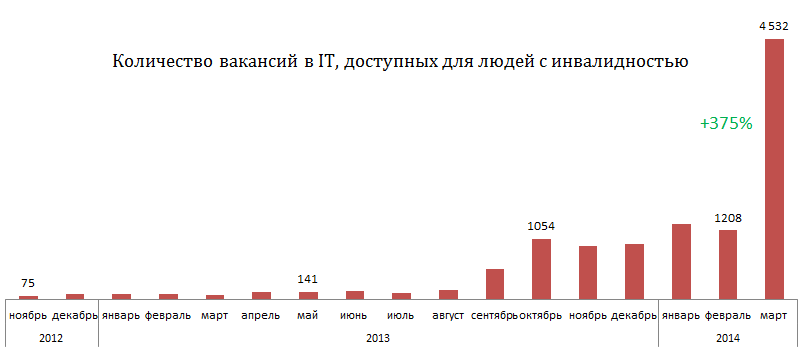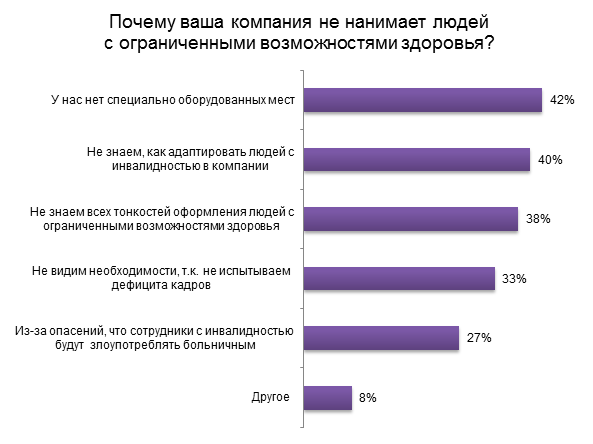Is it easy for a person with a disability to find a job in IT
A little over a year ago, we wrote that we launched on hh.ru a job marking for people with disabilities. With the general approval of the initiative, there was criticism, which boiled down to the fact that vacancies should be accessible to everyone without special markings. In an ideal world, it probably is, but ours, unfortunately, is not like that, and everyone wants to have a job.
Time has shown that we have begun the necessary business: since November 2012, 49,684 vacancies received such markings, real examples of employment appeared.
IT is the first area today in terms of the number of vacancies available for people with disabilities - 4,050 vacanciesor one in ten of the total in IT. Despite the fact that in the middle of last year she was only in third place after the sales and media sectors.
Growth over the past month is explosive - 375%!

I propose to look at the situation in more detail: regional division, salaries, work schedule and some conclusions.
Most of it falls on Russia, but there are proposals in neighboring countries, unfortunately, not very much so far:
- Russia: 3507
- Ukraine: 338
- Kazakhstan: 98
- Belarus: 84
Here and below the number of vacancies is a link leading to the search engine of the same name inquiry. The number of vacancies is indicated on the morning of April 2 and may change slightly over time.
In Russia, as expected, Moscow leads, although other cities are not far behind as much as the total number of vacancies, top 15:
- Moscow: 208
- Moscow region: 180
- Sverdlovsk region: 142
- St. Petersburg: 126
- Nizhny Novgorod Region: 121
- Krasnodar Region: 116
- Republic of Tatarstan: 110
- Voronezh Region: 95
- Leningrad Region: 81
- Rostov Region: 80
- Novosibirsk Region: 79
- Perm Region: 74
- Chelyabinsk Region: 72
- Krasnoyarsk Territory: 61
- Kaliningrad Region: 60
According to the required work experience, it is clear that more than half of the vacancies are designed for young specialists. This, on the one hand, is encouraging, because it is the most difficult for people without experience to get a job and make a good start. But, on the other hand, I would like for vacancies for experienced programmers, testers, engineers and others to be marked:
- no experience: 2649
- from 1 year to 3 years: 1112
- from 3 to 6 years: 266
- more than 6 years : 29
By the way, a couple of days ago Apple posted its first 6 vacancies on hh.ru, and 4 of them are marked as accessible for people with disabilities.
The data on the proposed salary confirm what we saw in our work experience - a significant part of the vacancies are for beginners:
- from 25,000 rubles: 3345
- from 50,000 rubles: 2859
- from 70,000 rubles: 344
- from 95,000 rubles .: 199
- from 120,000 rubles: 121
However, if you dig deeper, you can see interesting offers:
- from 115,000 rubles: 128
- from 135,000 rubles: 72
- from 155,000 rubles: 54
- from 180,000 rub .: 18
- from 200 000 rub .: 11
Talented IT professionals with disabilities can easily find remote work - for many, this is ideal. However, not everyone can and wants to work from home: someone does not have conditions, someone wants a team and communication, and there are many of them. It is gratifying that at least 40% of full-time offers at the office are:
- remote work: 1959
- full day: 1795
- flexible schedule: 227
- shift schedule: 72
Here is the opinion of employers from our last case study. Why are they scared and do not want to hire people with disabilities:

Open answers from the first paragraph: (lack of specially equipped places, spelling and punctuation of the original saved):
- “There are no ramps, roomy elevators, large plates for the visually impaired”
- “There are no ramps, wide corridors (for those who move in a wheelchair), elevators. Computers as standard (not for visually impaired) ”
-“ Workplaces, freedom of movement around the office, restrooms ”
-“ No technical means are provided for people with limited mobility. The specifics of production excludes the possibility of attracting hearing impaired and visually impaired ”
-“ There is no elevator in the building, and our office is located on the 4th floor ”
-“ We don’t know what should be, therefore we are afraid that the company will have to incur financial and time costs for their equipment ”
“There are no ramps, the elevator is located far from the office, work involves multiple movements between offices and floors.”
Of course, our labor market is still very immature. There are still a lot of companies that are looking not at the professional qualities of the candidate, but at something else. And this “something” in them outweighs the knowledge and talent of a person. Many companies that simply do not want to spend money to make an office accessible, for example, for people in wheelchairs. And, nevertheless, even in small steps, albeit so “clumsy", from the point of view of idealists, markings, but we still become kinder and more honest to each other.
Time has shown that we have begun the necessary business: since November 2012, 49,684 vacancies received such markings, real examples of employment appeared.
IT is the first area today in terms of the number of vacancies available for people with disabilities - 4,050 vacanciesor one in ten of the total in IT. Despite the fact that in the middle of last year she was only in third place after the sales and media sectors.
Growth over the past month is explosive - 375%!

I propose to look at the situation in more detail: regional division, salaries, work schedule and some conclusions.
Most of it falls on Russia, but there are proposals in neighboring countries, unfortunately, not very much so far:
- Russia: 3507
- Ukraine: 338
- Kazakhstan: 98
- Belarus: 84
Here and below the number of vacancies is a link leading to the search engine of the same name inquiry. The number of vacancies is indicated on the morning of April 2 and may change slightly over time.
In Russia, as expected, Moscow leads, although other cities are not far behind as much as the total number of vacancies, top 15:
- Moscow: 208
- Moscow region: 180
- Sverdlovsk region: 142
- St. Petersburg: 126
- Nizhny Novgorod Region: 121
- Krasnodar Region: 116
- Republic of Tatarstan: 110
- Voronezh Region: 95
- Leningrad Region: 81
- Rostov Region: 80
- Novosibirsk Region: 79
- Perm Region: 74
- Chelyabinsk Region: 72
- Krasnoyarsk Territory: 61
- Kaliningrad Region: 60
According to the required work experience, it is clear that more than half of the vacancies are designed for young specialists. This, on the one hand, is encouraging, because it is the most difficult for people without experience to get a job and make a good start. But, on the other hand, I would like for vacancies for experienced programmers, testers, engineers and others to be marked:
- no experience: 2649
- from 1 year to 3 years: 1112
- from 3 to 6 years: 266
- more than 6 years : 29
By the way, a couple of days ago Apple posted its first 6 vacancies on hh.ru, and 4 of them are marked as accessible for people with disabilities.
The data on the proposed salary confirm what we saw in our work experience - a significant part of the vacancies are for beginners:
- from 25,000 rubles: 3345
- from 50,000 rubles: 2859
- from 70,000 rubles: 344
- from 95,000 rubles .: 199
- from 120,000 rubles: 121
However, if you dig deeper, you can see interesting offers:
- from 115,000 rubles: 128
- from 135,000 rubles: 72
- from 155,000 rubles: 54
- from 180,000 rub .: 18
- from 200 000 rub .: 11
Talented IT professionals with disabilities can easily find remote work - for many, this is ideal. However, not everyone can and wants to work from home: someone does not have conditions, someone wants a team and communication, and there are many of them. It is gratifying that at least 40% of full-time offers at the office are:
- remote work: 1959
- full day: 1795
- flexible schedule: 227
- shift schedule: 72
Here is the opinion of employers from our last case study. Why are they scared and do not want to hire people with disabilities:

Open answers from the first paragraph: (lack of specially equipped places, spelling and punctuation of the original saved):
- “There are no ramps, roomy elevators, large plates for the visually impaired”
- “There are no ramps, wide corridors (for those who move in a wheelchair), elevators. Computers as standard (not for visually impaired) ”
-“ Workplaces, freedom of movement around the office, restrooms ”
-“ No technical means are provided for people with limited mobility. The specifics of production excludes the possibility of attracting hearing impaired and visually impaired ”
-“ There is no elevator in the building, and our office is located on the 4th floor ”
-“ We don’t know what should be, therefore we are afraid that the company will have to incur financial and time costs for their equipment ”
“There are no ramps, the elevator is located far from the office, work involves multiple movements between offices and floors.”
Of course, our labor market is still very immature. There are still a lot of companies that are looking not at the professional qualities of the candidate, but at something else. And this “something” in them outweighs the knowledge and talent of a person. Many companies that simply do not want to spend money to make an office accessible, for example, for people in wheelchairs. And, nevertheless, even in small steps, albeit so “clumsy", from the point of view of idealists, markings, but we still become kinder and more honest to each other.
